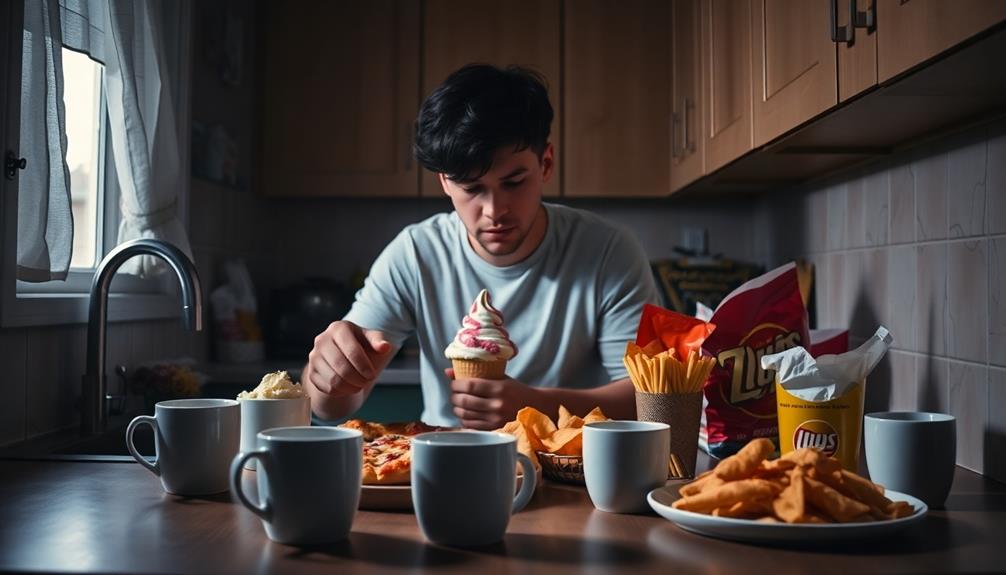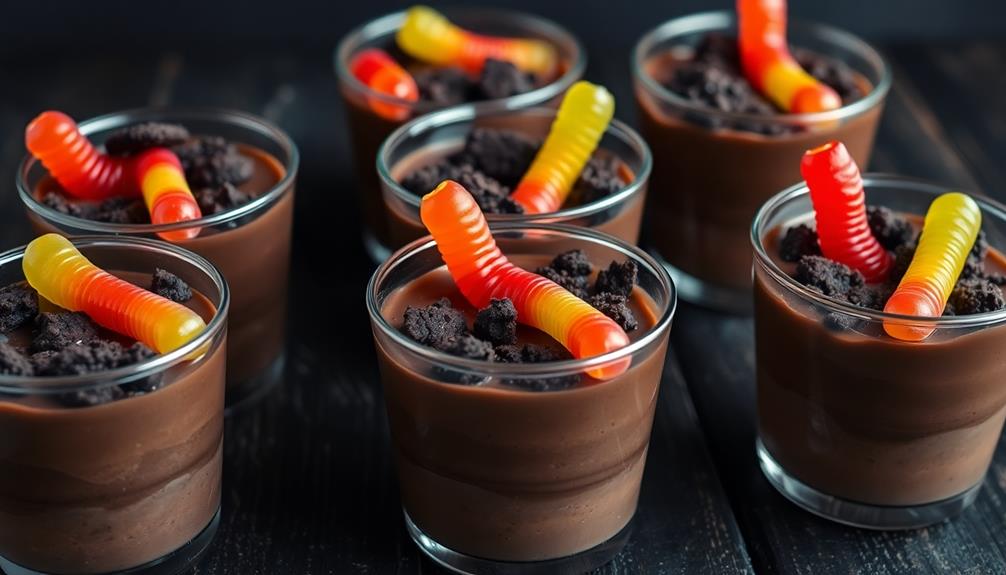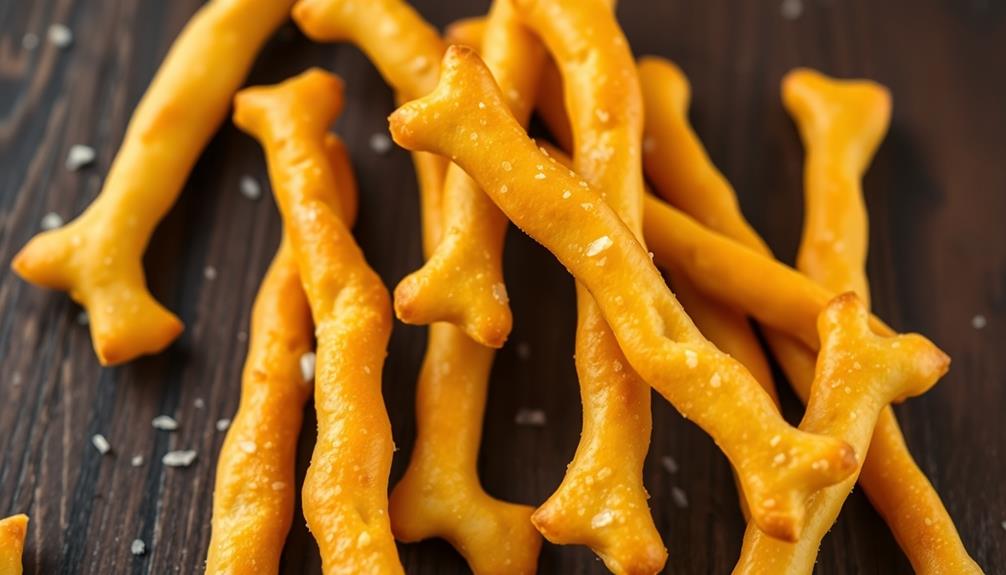When you're sleep deprived, your brain craves comfort foods. This happens because lack of sleep increases ghrelin, which boosts your hunger, while decreasing leptin, leaving you feeling less full. You also experience heightened sensitivity to sweet and savory flavors, making sugary treats irresistible. Plus, your olfactory senses become sharper, enhancing the appeal of tempting food smells. Psychologically, you might find that you respond more strongly to cravings, pushing you toward those high-calorie options. Understanding these influences can help you navigate your cravings better and make more balanced choices moving forward.
Key Takeaways
- Sleep deprivation enhances the enjoyment of sweet, umami, and sour flavors, making these tastes more appealing.
- Increased olfactory sensitivity during lack of sleep amplifies the allure of food odors, influencing cravings.
- Altered taste perception makes sweetness particularly enticing, driving cravings for sugary snacks.
- Psychological responses to food intensify during sleep deprivation, leading to a preference for comforting, indulgent treats.
- The hedonic response to flavors increases, making rich, calorie-dense foods harder to resist when sleep-deprived.
The Science of Sleep Deprivation
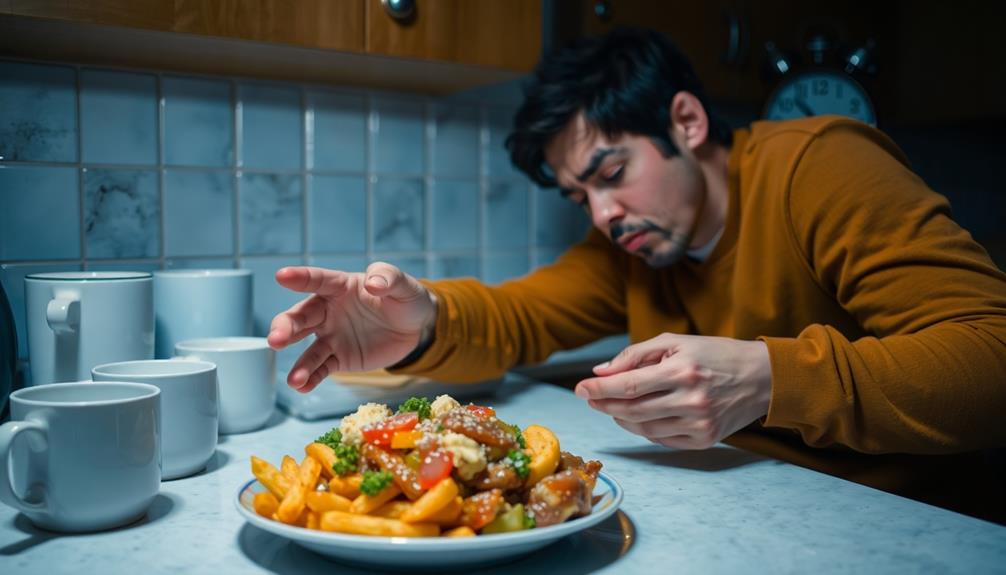
Sleep deprivation affects your body in more ways than you might think. When you don't get enough sleep, your brain's neural activity in regions tied to hunger ramps up, making you more sensitive to food stimuli. This heightened activity can lead to intense food cravings, especially for high-fat and calorie-dense options.
For example, you might find yourself craving dishes like Caldeirada or other rich Brazilian foods rather than healthier alternatives.
Hormonal changes play an essential role here, too. Sleep deprivation elevates your ghrelin levels, the hormone that signals hunger, while decreasing leptin, which tells you when you're full. This imbalance can leave you feeling hungrier than usual, pushing you toward less nutritious food preferences.
Notably, altered sweet taste perception can occur, making sugary foods seem even more appealing. Your olfactory system also becomes hyperactive when sleep-deprived, enhancing your ability to detect food odors, further influencing your choices towards energy-dense foods.
Effects on Taste Perception
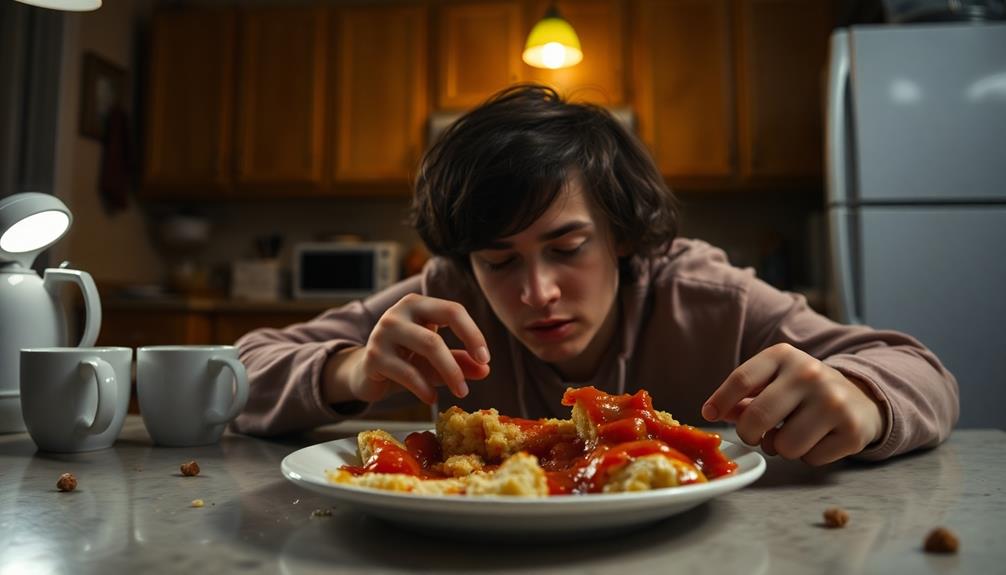
When you're running low on sleep, your taste perception changes in surprising ways. Sleep deprivation heightens your enjoyment of sweet, umami, and sour flavors, making certain foods taste more intense and rewarding.
For instance, you might find yourself craving indulgent treats like Kue Putu or Dadar Gulung, as their rich flavors and comforting textures appeal to your altered taste perception. You might also find yourself gravitating toward high-fat and calorie-dense foods, as your altered taste perception influences your food choices.
Research shows that when you're sleep-deprived, your cravings for energy-dense foods increase. This correlation highlights how your sleep status impacts your taste preferences.
As you experience more sleepiness, your olfactory system becomes hyperactive, enhancing your ability to detect food odors and further influencing your taste perception.
The hedonic response to flavors intensifies under these conditions, leading you to seek out the comfort of rich, indulgent treats. Sweet tastes can become especially appealing, driving you to choose foods that satisfy those cravings. Microgravity’s impact on taste perception has been studied extensively, with research showing that the absence of gravity can alter how we perceive flavors. In this unique environment, individuals may experience changes in their taste preferences and cravings, making sweet and rich foods even more desirable. The lack of gravity can also affect the way certain flavors are perceived, potentially intensifying the hedonic response to specific tastes.
Fundamentally, sleep deprivation not only alters your taste but also propels your desire for specific food types, transforming your eating experience into one that favors sweetness and high-fat indulgences.
Sweet Cravings and Food Choices
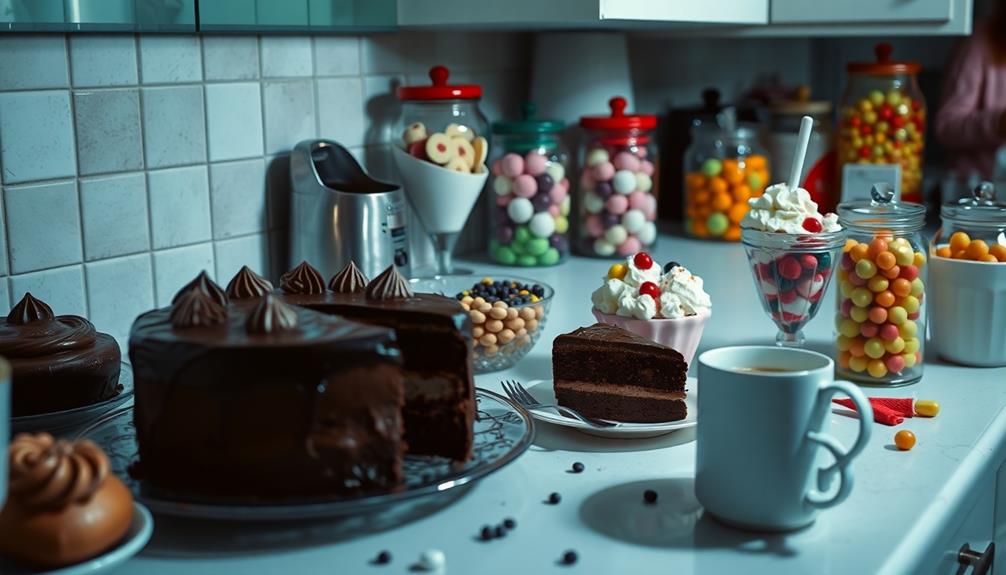
Cravings for sweet treats can become overwhelming after a night of insufficient sleep. Sleep deprivation not only heightens your sensitivity to sweet tastes but also shifts your food choices dramatically. You may find yourself reaching for chocolate or sugary snacks instead of healthier options like Mushroom Masala or Gobi Manchurian.
This preference for energy-dense foods stems from a disruption in the balance of hunger hormones. When you're sleep-deprived, ghrelin levels increase, while leptin levels drop, leading to heightened cravings and increased food intake.
Your taste perception changes, making you more attuned to the sweetness of foods and driving you to seek out those rewarding flavors. This heightened reward sensitivity can make it difficult to resist the temptation of sweets, as your brain craves the quick energy boost that these high-calorie options provide.
Additionally, enhanced olfactory sensitivity during sleep deprivation can amplify cravings, as appealing food odors become even more enticing.
In this state, it's easy to fall into a cycle of choosing sugary snacks, which can lead to poor dietary choices and further impact your energy levels. Recognizing these patterns can help you make more mindful eating decisions, even when sleep is lacking.
Hormonal Changes and Appetite
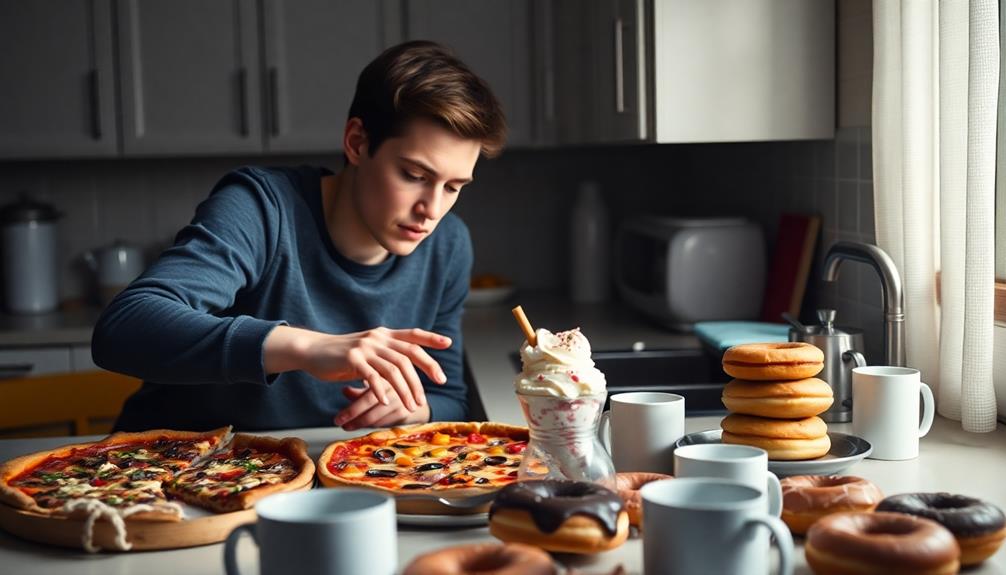
Hormonal changes play an essential role in how appetite and food choices shift after a night of poor sleep. When you experience sleep deprivation, your body raises levels of ghrelin, the hunger hormone, which leads to increased feelings of hunger and stronger cravings for high-calorie foods.
At the same time, sleep loss reduces leptin, the hormone that signals satiety, leaving you feeling hungrier and more inclined to overeat. This phenomenon can often lead to a desire for rich flavors in dishes, such as Red-Braised Pork Belly or Cumin Lamb, which are both high in fat and deeply satisfying.
These hormonal changes can greatly alter your food preferences, steering you toward energy-dense options that are high in fat and sugar. Research shows that when you're sleep-deprived, your cravings intensify for these indulgent foods, making it harder to resist temptations.
Increased sympathetic nerve activity during sleep deprivation further complicates this picture, promoting additional hunger and persistent cravings.
As a result, the interplay between disrupted sleep and hormonal regulation not only affects your appetite but also influences your overall dietary choices. You may find yourself reaching for that sugary snack or greasy meal more readily when you're short on sleep, highlighting how essential restful nights are for maintaining healthy eating habits.
Psychological Factors at Play
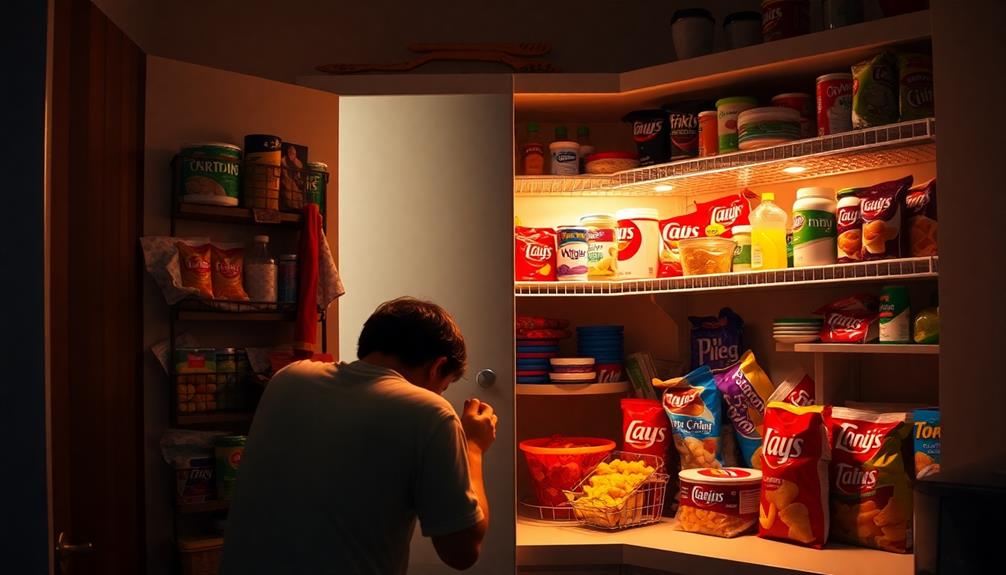
Often, sleep deprivation leads to a heightened psychological response to food, steering you towards those indulgent treats that feel comforting and satisfying. When you're short on sleep, cravings for high-fat foods and calorie-dense options intensify. This shift occurs partly due to increased levels of the hunger hormone ghrelin, which drives you to seek out highly palatable foods.
Your brain becomes more responsive to food cues, making those rich, sugary snacks even harder to resist. For instance, during Halloween, Graveyard Taco Dip and other festive treats can become especially appealing in these moments of deprivation. Additionally, sleep deprivation heightens your olfactory sensitivity, allowing you to detect food odors more acutely. This can influence your desire for specific comfort foods that are typically high in fats and sugars.
Psychological factors, including stress and emotional states, also play a significant role, exacerbating your cravings during these periods.
Moreover, mental imagery associated with food can lead to a disconnect between your true hunger signals and your impulsive food choices. With altered taste sensitivity, you might find that foods you once enjoyed now seem less appealing, while those calorie-dense options take center stage in your mind.
Consequently, sleep deprivation creates a perfect storm for unhealthy eating habits, driven by powerful psychological influences.
Strategies for Better Eating
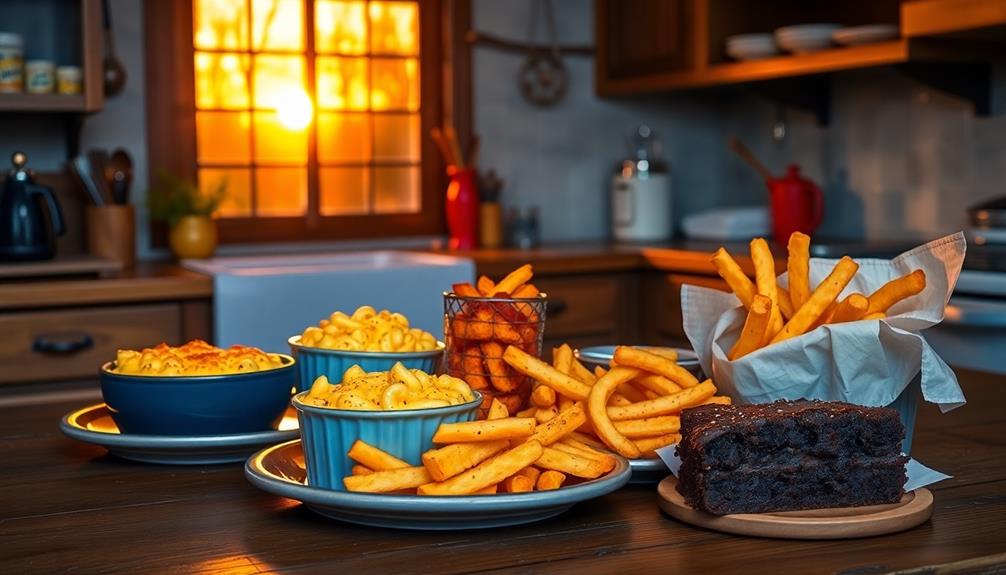
How can you make better food choices when you're sleep-deprived? Start by prioritizing consistent sleep schedules. Better sleep can regulate cravings, making it easier to choose healthier options.
When you're feeling tired, incorporate nutrient-dense foods into your meals and snacks. This helps combat those pesky cravings for high-fat and high-sugar foods that often pop up during poor sleep. For instance, consider preparing a comforting Nettle and Potato Soup that offers a creamy texture while being packed with essential vitamins and minerals.
Reducing stress is vital, too. High stress can lead to unhealthy food choices, so consider mindfulness techniques or meditation to keep cravings in check.
Another effective strategy is to limit your exposure to tempting food environments, especially when you're fatigued. This can help prevent you from giving in to energy-dense options. One way to limit your exposure to tempting food environments is to plan and prepare your meals in advance. This can help you avoid the need to go to places that may have tempting, unhealthy food options. Instead, you can stock your kitchen with healthy, nutritious foods that are readily available when hunger strikes. For example, try making a zombie zucchini recipe that is both delicious and low in energy density, making it a great option for when you’re fatigued and tempted to reach for unhealthy snacks.
Experiment with balanced meals that include protein, fiber, and healthy fats. These combinations stabilize hunger levels and considerably reduce the risk of binge eating.
Frequently Asked Questions
Does Sleep Deprivation Affect Taste?
Yes, sleep deprivation affects your taste. When you're tired, your brain processes flavors differently, making certain tastes more intense. You may crave richer, more indulgent foods as your body's hunger signals become heightened during fatigue.
Why Does Food Taste Better When You're Tired?
When you're tired, your taste buds become more sensitive, making flavors pop. Plus, your brain craves quick energy, leading you to enjoy rich, indulgent foods more. It's that heightened enjoyment that makes everything taste better.
Why Does Food Taste so Good When You're Starving?
When you're starving, the old saying "hunger is the best sauce" rings true. Your senses sharpen, amplifying flavors. Each bite feels more intense, turning simple meals into delicious feasts as your body craves nourishment.
How Does Lack of Sleep Affect Food Choices?
Lack of sleep impacts your food choices by increasing cravings for high-fat and sugary items. You'll find yourself drawn to energy-dense snacks, as hormonal changes heighten hunger and sensitivity to food odors.
Conclusion
When it comes to sleep deprivation, you might just find that "absence makes the heart grow fonder"—or in this case, your appetite! With altered taste perceptions and cravings for sweeter foods, staying up late can trick your brain into seeking out those indulgent snacks. By understanding these changes, you can make better food choices, even when tired. Remember, a good night's sleep isn't just about rest; it's key to eating well too!
